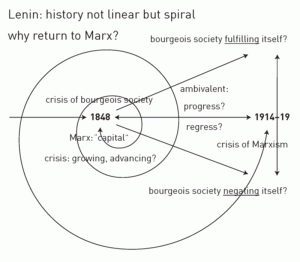Chris Cutrone
Presentation for the Platypus Affiliated Society, Saturday, December 17, 2011, at the School of the Art Institute of Chicago. Please see “The relevance of Lenin today” essay, published in the Platypus Review, Weekly Worker, and Philosophers for Change.
The Encyclopedia Britannica‘s entry on Lenin states that,
If the Bolshevik Revolution is — as some people have called it — the most significant political event of the 20th century, then Lenin must for good or ill be considered the century’s most significant political leader. Not only in the scholarly circles of the former Soviet Union, but even among many non-Communist scholars, he has been regarded as both the greatest revolutionary leader and revolutionary statesman in history, as well as the greatest revolutionary thinker since Marx.
Lenin is the most controversial figure in the history of Marxism, and perhaps one of the most controversial figures in all of history. As such, he is an impossible figure for sober consideration, without polemic. Nevertheless, it has become impossible, also, after Lenin, to consider Marxism without reference to him. Broadly, Marxism is divided into avowedly “Leninist” and “anti-Leninist” tendencies. In what ways was Lenin either an advance or a calamity for Marxism? But there is another way of approaching Lenin, which is as an expression of the historical crisis of Marxism. In other words, Lenin as a historical figure is unavoidably significant as manifesting a crisis of Marxism. The question is how Lenin provided the basis for advancing that crisis, how the polarization around Lenin could provide the basis for advancing the potential transformation of Marxism, in terms of resolving certain problems.
The Frankfurt School Critical Theorist Theodor Adorno, in his 1966 book Negative Dialectics, wrote of the degeneration of Marxism due to “dogmatization and thought-taboos.” There is no other figure in the history of Marxism who has been subject to such “dogmatization and thought-taboos” as much as Lenin.
It is important to note as well that Adorno himself sought to remain, as he put it, “faithful to Marx, Engels and Lenin, while keeping up with culture at its most advanced,” to which his colleague Max Horkheimer replied, simply, “Who would not subscribe to that?”
Today, such a proposition seems especially implausible, in many ways. Yet perhaps the memory of Lenin haunts us still, however obscurely.
This discussion about the relevance of Lenin today is in anticipation of Platypus’s Winter–Spring 2012 primary Marxist reading group, on the history of revolutionary Marxism, centered on the writings of Lenin, Luxemburg, Trotsky, and Adorno.
Recommended background readings:
• “1917”
• “Lenin’s politics”
 (Cover of Time magazine vol. 175 no. 28 December 26, 2011–January 2, 2012, design by Shepard Fairey.)
(Cover of Time magazine vol. 175 no. 28 December 26, 2011–January 2, 2012, design by Shepard Fairey.)
 (Lenin: history not linear but spiral. [PDF])
(Lenin: history not linear but spiral. [PDF])
(Video recording: Discussion begins at ~14:00.)